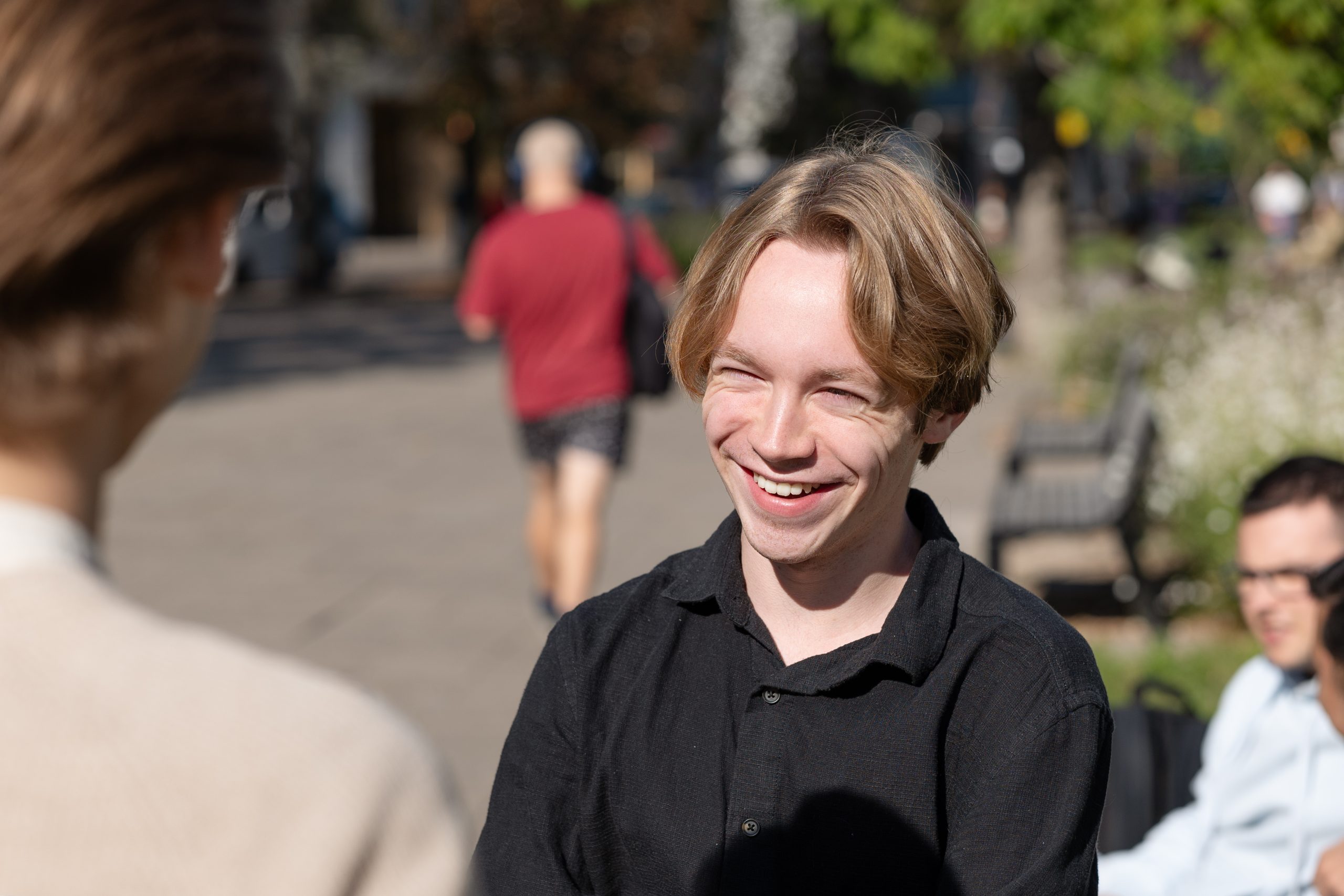In today’s globalized world, language is vital in connecting cultures, breaking barriers, and creating opportunities. As Europe celebrates the European Day of Languages on September 26th, the focus shifts to the crucial role language plays in fostering integration, personal growth, and global cooperation.
Sean Christopher Fitzpatrick, an Irish student at Vilnius University Institute of International Relations and Political Science, is a great example. He came to Vilnius with a strong interest in global affairs and a deep admiration for Lithuania’s leadership in responding to international crises. Sean’s experience reflects the broader shifts in Europe, where immigration, education, and language are fascinatingly reshaping national identities.
Lithuania’s New Role: From Emigration to Multicultural Hub
Lithuania has historically experienced high emigration rates, especially after joining the European Union in 2004. However, in recent years, there has been a significant change. By 2023, foreign nationals made up nearly 10% of Lithuania’s university student population, bringing their unique perspectives and experiences worldwide. This influx of international students has transformed Lithuania’s universities into vibrant global learning and exchange hubs.
Like many others, Sean saw Lithuania as the ideal place for higher education. However, studying there meant a new personal growth journey and learning one of the most intricate and historically rich languages: Lithuanian.
Lithuanian, known for its complex grammar and distinct phonetics, can be a daunting challenge for newcomers. Despite these challenges, Sean found that learning the language opened doors to deeper cultural understanding. What was initially a source of anxiety – whether to use the genitive or nominative case when ordering a latte – soon became an opportunity to connect with locals.
Language as the Key to Success and Integration
Employers, governments, and educators view multilingualism as a sign of adaptability and cultural understanding. International students who learn the host language are more likely to integrate, find employment, and contribute locally.
After Sean arrived, he started learning Lithuanian and found it oddly familiar. Later, he realized that he had childhood friends who spoke Lithuanian with their parents. In a sense, he had been hearing the language all his life without realizing it.
“Learning Lithuanian has not been without its challenges,” says Sean. “The noun case system, for instance, was completely foreign to me. Trying to memorize the various word endings at first felt like an impossible task. The verb prefixes also took some getting used to, especially when distinguishing between emphasizing the process or the result in different contexts. It’s something I’m still working on mastering.”
As Sean’s proficiency improved, he began to see the rich layers of Lithuanian culture embedded in the language. He was amused and charmed by the frequent use of diminutives, which reflect the warmth and affection with which Lithuanians speak to each other. Contrary to the stereotype of Northern Europeans as cold or reserved, the language revealed a deeply familial, caring, and community-oriented society.
Unlocking Joys of Language
Language learning can be deeply personal and often quite amusing. Sean shares, “The awkward situations are necessary! Your tongue shouts down to your throat and up to your mind that you are an idiot every single day. You learn to laugh about it. You laugh about this, and then you laugh about that. You loosen up. Then, it all starts rolling off. Everything’s alright, and a couple more million people can tell you that now.”
For Sean, learning Lithuanian was full of linguistic missteps, such as telling a friend’s mother that their father “couldn’t wash himself” instead of “couldn’t swim.” Rather than causing embarrassment, these mistakes often led to moments of laughter and connection. These moments are a reminder that language learning is as much about being vulnerable and human as it is about acquiring a skill.
One of the most striking cultural insights came through Sean’s immersion in Lithuania’s national passion for basketball. Phrases like “Trys Milijonai” (“Three Million”) reflect a deep love for the sport and the collective pride and unity that basketball brings to the Lithuanian people.
“Learning Lithuanian has helped me feel integrated. Understanding what people on the street are saying prevents me from feeling lost. Speaking Lithuanian makes a good impression on people and makes them more interested in talking with you. I could not survive playing football without knowing Lithuanian, so it has enabled me to continue enjoying my hobbies. The ability to follow a subtitled film is massively important for me. I am very glad not to have any issues there,” says Sean.
Language and Integration – Our Shared Duty
Learning Lithuanian underscores the importance of language in a globalizing world. As societies grow more multicultural, language learning fosters inclusivity and understanding. For international students like Sean, it was not just a personal achievement but a way to break barriers and connect across cultures.
“I hope learning Lithuanian will influence my future career! It’s challenging, but fun. Hopefully, recruiters will see it as an indication of openness and willingness to learn,” says Sean.
Language learning fosters empathy, connection, and understanding, deepening our appreciation of different cultures. By promoting linguistic diversity, we can unlock the rich potential of languages, fostering a more connected global community.









